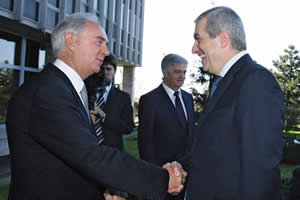Car deal drives up confidence in Romania
Ford’s entry into Romania should increase confidence for US reluctance to invest in Romania
 |
|
|||||||||||||
US investment in Romania has received an injection of confidence following Ford Motor Company’s decision to begin production in the former Daewoo Craiova car factory in Dolj county.
While Romania has been a site for the production of car parts for US companies, such as cables and bearings, this is the first time a strong American brand has made a billion-Euro plus commitment to the country’s manufacturing industry.
The global giant will modernise the existing factory and its Transit Connect model is set to roll off Craiova’s assembly lines in the middle of 2009.
Sole bidder for the factory Ford bought the car plant for 57 million Euro from the privatisation authority (AVAS). But the deal was in the balance while the European Commission carried out an investigation into whether Romania had provided state aid to the plant, which is illegal under EU law. The conditions of sale, including minimum production levels and employment guarantees, determined a lower sales price for the car plant. The EC considered this to be state aid and last February ruled that the state had to recover 27 million Euro from the US car company.
By 2010 the factory will also be the unique site for production of a small car for sale in Europe.
“We are committed to transforming Craiova into a state-of-the-art manufacturing plant through an investment of 675 million Euro,” John Fleming, President and CEO, Ford of Europe said last March.
By 2012 Ford expects spend around one billion Euro a year in Romania to support the Craiova operations, with a workforce of 7,000.
Ford Motor Company
Owner of Ford Craiova
■ 2009: Set to start constructing Transit Connect
■ 2010: Set to construct new small car for European market
■ Employees at Craiova: in the region of 3,900
■ Annual forecast vehicle and engine production: 300,000
Bechtel: costs for motorway may be adjusted
One of the largest road projects in Europe, Autostrada Transilvania has courted controversy ever since the 2.24 billion Euro contract for the US company Bechtel was granted to the company without an open tender in 2003.
Since then work has started on the four-lane, 415-kilometre motorway, stretching northwest from Brasov in central Romania to Oradea on the country’s border with Hungary.
But this has been upset by the Government’s late payments to the company and fears of spiralling costs.
The Government spending on the motorway is expected to rise above its 2003 price tag. Ex-Transport Minister Radu Berceanu has reportedly said the final amount for the highway will cost between seven and ten billion Euro – up to four times the expected amount. The initial cost was based on feasibility studies for the motorway and there is an annex in the contract which allows the price to increase.
Bechtel says the final design of the motorway has been completed only for two of the eight sections and hints that costs may rise. “Any estimates given [about the costs] are only estimates,” says corporate affairs director Bechtel Romania, Bogdan Sgarcitu. “Thus, the actual costs of the project may be adjusted if the works performed differ from the initial estimates.”
Bechtel argues that there are new structures which were not detailed in the original contract, such as a viaduct near Suplacu de Barcau, Bihor county.
Construction work is underway on the motorway sections Campia Turzii – Cluj West (Cluj county) and Suplacu de Barcau – Bors (Bihor county), which must be completed by 2010. “It should be a common effort and if all the parties involved deliver on time, then we can show great progress this year,” adds Sgarcitu.
When we went to press Bechtel had not received payment from the Government for executed works as of April 2008. “However, the authorities ensured us that additional funding will be provided in the near future,” says Sgarcitu.
Bechtel is concentrating its activities on Autostrada Transilivania, but does not rule out entering into tenders for other public works in the country. “We are always looking at potential business opportunities and assess them accordingly,” adds Sgarcitu.
Bechtel
Constructor of Autostrada Transilvania
■ A four-lane 415 km motorway between Brasov and Bors on the Hungarian border
■ Completion date: 2013
■ Number of workers: over 3,900
Smithfield: future investments depend on action against swine fever
Last Autumn one of the largest US investors in Romania, pork producer Smithfield, slaughtered and incinerated 55,000 pigs at three of its farms where classical swine fever (CSF) broke out.
This was despite an ongoing Government programme to vaccinate pigs against the spread of the disease, which is endemic to Romania’s millions of backyard and farmyard pigs and wild boar population.
CSF is transmittable between hogs and, in its acute form, is fatal for pigs and a death sentence for a generation of hogs in the location of a disease case.
However the firm says that the authorities had run out of the vaccine prior to last year’s outbreak.
“These epidemics broke out 60 days after the Romanian authorities ceased the delivering of doses and the vaccination of pigs due to a temporary deficit in the supply of CSF vaccine,” says Bogdan Mihail, general manager of Smithfield Ferme. “By now, the authorities in-charge with the investigation should have come up with an answer, but there has been no official statement on the origin and the traceability of the virus that infested Smithfield’s three farms.”
Now these three farms have been declared CSF free and the company has resumed activity in two of the farms while the third will re-open soon. “We are imposing and monitoring the observance of strict bio-security measures,” adds Mihail. “We are continuously investing in both modern technology, in training and raising awareness in communities and for the contractors that Smithfield is working with.”
In May 2008 the Romanian authorities stopped the commercial farm-based vaccination programme. Only back-yard pigs and the wild boar population will still be vaccinated with the live vaccine until the end of 2008. “This increases the risk of having an outbreak,” argues Mihail, “because the country has a mixed status of immunology in the pig population, some are vaccinated and others are not.”
But Smithfield Ferme will continue the anti CSF vaccination with the marker vaccine using its own funds.
Now Smithfield’s expansion plan for a billion Euro plus commitment to Romania has lessened its pace. “Smithfield Foods has invested 600 million USD so far in Romania and could continue, depending on the implementation of a viable strategy for the eradication of CSF,” says Mihail.
Smithfield Ferme
■ Investment in Romania: around 500 million Euro
■ 25 authorised farms with 37,000 sows
■ Annual pig production: 550,000
■ Employees: 1,000 in farms in Arad and Timis counties
■ Employees: 400 in Smithfield Procesare abattoir
GE: six projects in logistics and distribution planned
For General Electric in Romania the main engines of growth are the energy sector, medical equipment, financial services and now real estate.
“GE plans to consolidate its position developing logistics and distribution parks,” says Cristian Colteanu, regional executive Romania, Bulgaria & Republic of Moldova. “The works on six of these projects summing up 315,000 sqm will start in the second half of this year.”These will be developed in locations including Bucharest, Brasov and Cluj-Napoca.
In Romania, GE has invested in the development of industrial parks through GE Real Estate, hi-tech through its purchase of aircraft engine components firm Turbomecanica, while GE Money has bought Motoractive Leasing, consumer finance Estima finance and mortgage loans firm Domenia Credit.
In the renewable energy sector, GE will focus on wind and solar power. “Wind energy is now in fashion and we have been approached by many important developers,” says Colteanu. “As a supplier of wind turbines, we are not interested in projects of less than 50 MW. We are in discussions with some developers.” Colteanu believes the most profitable and efficient wind parks are those that can produce more than 200 MW.
In conventional energy, GE Energy, together with its consortium partner Greek group Metka, plans to build a gas-fired power plant at Petrom’s refinery in Brazi, near Ploiesti, Prahova county. The combined-cycle plant will produce approximately 860 MW. Around 20 per cent of the plant’s electricity output will be used by Petrom for its own operations, while the remainder will be available on the Romanian power grid. Construction is planned to start in early 2009 and is expected to begin supplying power in the second half of 2011. For GE this contract value is about 256 million Euro.
GE is also participating in the auction organised by the Health Ministry to build 28 new hospitals and modernise many others in a three billion Euro project.
General Electric
■ Most dynamic sectors of growth in Romania: energy, medical equipment, real estate and financial service
■ Employees: 1,000
■ Investments in Romania, Bulgaria and Republic of Moldova: 320 million Euro
■ Sales in the three countries: 250 million Euro [80 per cent from Romania]
Pioneer: agro future rests on mid-sized farmer
“The small farmer in Romania is not the farmer of the future, but the middle-size farmer with land plots of around 1,000 hectares,” says Sorin Ovidiu Otelea, production manager at the Romanian subsidiary of seed manufacturer Pioneer. “Romanian agriculture is developing at a fast rate in eastern Europe and Romania, especially, so Pioneer wants to contribute to this development.”
This year Romanian farmers have begun to receive their first payments from the EU Common Agricultural Policy, which should enhance a rebirth in the sector.
Meanwhile Pioneer is boosting its production capacity in Romania, where it manufactures maize, sunflower, soybean and, more recently, rape seeds. This is now the company’s second-largest facility in Europe after Hungary. In Romania the company expects to produce 0.7 million sacks of 23 kilograms in 2008 and one million sacks in 2009. More than 65 per cent of its production is exported to countries such as Russia and Ukraine.
The US company plans to expand its local facilities with a seven million Euro investment plan for 2009 and 2010 and Otelea says Pioneer Romania plans to be the market leader in rape seed production in three years.
Pioneer Romania
Seed manufacturer
■ Ranking in sector: first
■ 2007 turnover: 47.5 million Euro
■ 2007 profit: 15.5 million Euro
■ 2008 forecast turnover: 60 million Euro
■ 2008 forecast profit: 18 million Euro
Employees: 130
Microsoft: consumer preference moving away from pirate software
Due to a decline in appetite for pirate software, the consumer sector in IT is opening up new opportunities. In 1996, when Microsoft started its operations in Romania, around 93 per cent of software used on the market was illegal. Now this has dropped to around 67 per cent.
“There is still a way to go, but the trend is there,” says Silviu Hotaran general manager Microsoft Romania. “We are starting to see a willingness of consumers to use legal software.”
Consumers are more commonly purchasing software packages with their hardware. They also perceive benefits from the legal route, such as accessing technical support online and employing help in attacking viruses. “There is a maturity across all the industry and from the customer side is very encouraging,” adds Hotaran.
Last year Microsoft opened a global technical support centre offering assistance for niche and critical applications for large corporations in Europe, Middle East and Africa. So far the company has hired over 100 at the centre in Bucharest. “How much this is going to [expand] is a matter of market demand,” adds Hotaran.
In the last few years the company’s business grew by an average annual growth of 50 per cent. “We have to show how we can sustain growth, because the GDP growth and IT spend is positive, but doesn’t relate to this figure,” he says.
The general manager of Microsoft says the fear of lack of IT specialists is a “little bit exaggerated”, but does not underestimate the danger. Salary increases in IT are happening. Together with its other IT companies, Microsoft is partnering with the education system and also accepting interns from universities.
Microsoft is planning to open a local legal entity in the Republic of Moldova during the fiscal year beginning this month, which will probably mean in the first half of 2009.
Microsoft Romania
Subsidiary office and technical support centre
■ Started: 1996
■ Support centre open: 2007
■ Employees in total: over 200
Citibank: nearly 50 per cent increase in profits
In 2007 Citibank Romania registered a 71 per cent increase in total assets, a 45 per cent increase in net profit and a 133 per cent increase of the consumer loan portfolio. This has largely been driven by higher customer volumes and higher trading revenues.
“We see high growth potential in our consumer and corporate business – both by network expansion and the launch of new products,” says Shahmir Khaliq, general director of Citibank Romania.
In 2007, energy distribution companies Enel Energie and CEZ Vanzare mandated Citibank Romania to collect their bills through the national postal network Posta Romana.
In the same year Citibank Romania launched eight new consumer finance CitiFinancial branches and another seven new direct sales centres. In the near future, Citibank will continue to build its retail presence. “Citibank will also continue to grow its small and medium enterprises business [sector], and to expand it even to lower tier segments than we presently address.” says Khaliq.
Citibank Romania
■ Assets: approx 1.1 billion Euro
■ Net loan portfolio: approx 453 million Euro
■ Employees: 618
■ Branches: 47 out of which eight are corporate banking and 39 CitiFinancial
■ Additionally, CitiFinancial has 50 direct sales centres
AIG: sales force boost sees 70 per cent growth
Life insurance player AIG Life Romania now ranks second in the sector after ING Asigurari de Viata, with a market share of 15.32 per cent.
In 2007 AIG Life’s portfolio of gross written premiums witnessed a growth of 70 per cent in a boost assisted by an increase in the company’s number of agents from 1,000 to 4,000, according to Theodor Alexandrescu, general director for AIG Life.
At the same time its gross profit grew by about 34 per cent to a total of around 9.2 million Euro, making the company the most profitable in its sector, according to the general director.
For 2008 AIG Life will open seven new agencies in cities such as Suceava, Bacau, Sibiu and Satu Mare and will continue to focus on organic growth. “Through many mergers or acquisitions a company loses from the quality of sales force and AIG Life does not want that for the moment,” says Alexandrescu. “That does not mean however that if a good opportunity shows up, we will not be interested.”
In Romania, AIG has also entered the compulsory private pension market which was launched last October. AIG Fond de Pensii [AIG Pension Fund] has signed up 261,472 participants and now ranks sixth in the market with a 7.3 per cent share.
AIG Life
■ Market share: 15.32
■ Gross written premiums 2007: 67.2 million Euro
■ Profit 2007: 9.2 million Euro
■ Employees: 121
■ Branches: 18
GE Money: increasing business by 50 per cent in 2008
Since taking over three non-banking financial services, GE Money has seen their collective volumes grow by over 65 per cent in 2007.
In 2006 the company entered Romania through the purchase of three non-banking financial services, leasing brand Motoractive, consumer finance brand Estima Finance and mortgage company Domenia Credit.
These have been rebranded as GE Money Leasing, GE Money Consumer Finance and GE Money Mortgage. “This year we estimate doubling the overall volume of loans for the three business segments and we expect a 60 per cent increase in assets to about 641 million Euro,” says Ronald Malak, CEO GE Money Romania.
By 2011 the company plans to triple its assets to two billion Euro. Last year the company increased its branches from 25 to 50 and its headcount by 50 per cent to 900.
GE Money Romania includes:
■ GE Money Mortgage
■ GE Money Leasing
■ GE Money Consumer Finance
■ Employees: 900
■ Branches open: 50
■ Clients: 350,000
Wrigley: preparing for Mars merger in autumn
Globally, gum giant Wrigley is preparing to merge with Mars in a process which the company believes will be finalised this autumn.
When the merger is finished, there will be no rebranding and Wrigley will remain a standalone subsidiary of Mars.
“There is a trend in consolidation on the consumer goods market to create the best conditions to penetrate emerging markets such as China or India, where a powerful mix of products has greater chances of success than a single company,” says Mihai Georgescu, managing director Wrigley Romania. “So the merger between Wrigley and Mars it is a logical move, especially when the two complement each other and none of the brands are in direct competition.”
Romania’s gum consumption is now around 92 sticks per capita, which is close to the average in other countries from central Europe such as Hungary or Poland, but below the west.
“The Romanian chewing gum market is quite mature, but there is potential to grow, especially when chewing gum holds a very big chunk of the total sweets market, with the Romanians preferring it to other sweets,” says Georgescu.
Last year the company grew its sales by around 25 per cent and, although Georgescu does not anticipate the same dynamism for 2008, he does expect double digit growth. This depends on other segments such as candies, fruit-flavoured sweets (jellies) and mints. For the moment the most successful brand is Orbit Professional, which holds a third of the total chewing gum market.
Although some commentators have argued that the frenetic expansion of supermarkets and hypermarkets will be a great boost for new sales, Georgescu is less optimistic. “The appearance of a hyper- or supermarket in a certain area usually makes ten or 40 small retailers close their business,” he says. “Before hyper- or supermarkets, a customer entered in two to six stores to buy all that was necessary and came in contact with impulse products, such as Wrigley’s, for two to six times. Now they only see them once.”
Wrigley Romania
Chewing gum and confectionery group
■ Employees: 205
■ Net sales: around 65 to 67 million Euro
■ Selling points: 100,000
White & Case: expanding greenfield team steadily
Seeing a gap in the market, White & Case is the only major greenfield investment in the last 18 months from a foreign or domestic law firm.
This comes at a time when UK magic circle rival Linklaters has radically downsized its local office.
“To build the team and the practice areas on which we wanted to focus, I tried to cherry pick some of the lawyers with whom I had previously worked, such as at Linklaters and the Ministry of Justice, as well as those against whom I had worked,” says Todd Shollenbarger, managing partner at White & Case.
Since the beginning of the year the number of lawyers increased from ten to 15, including two partners, ten associates and three trainees, with three more lawyers to join this summer. White & Case has plans to further expand the team by the end of the year.
“The strategy of the office is not to look to international clients, but to be a strong local firm with international clients,” Shollenbarger adds. “We always want to be at the top of each market we are in.”
The law firm’s initial priority is to concentrate on corporate M&A, capital markets, private equity, finance, project finance, and other commercial activities.
“Given the size of our international dispute resolution team, it is likely we will become involved in cases related to Romania,” says Shollenbarger.
“But White & Case does not have any current plans to build up a large litigation department in Bucharest, particularly as many major international disputes are resolved in established international arbitration centres or the courts of London and New York,” he adds.
White & Case
Law firm
■ Partners: Todd Shollenbarger and Delia Pachiu
■ Ten associates
CB Richard Ellis-Eurisko: planning growth by a third
US real estate agency CB Richard Ellis-Eurisko is targeting a 20 million Euro turnover for 2008 against the 14.3 million Euro posted last year by Eurisko, despite some analysts arguing that the dynamism of the real estate market is decelerating.
In 2007 CBRE acquired Romanian real estate agency Eurisko for a generous price of 22.55 million Euro, leading some commentators to speculate that properties were involved in the transaction. But managing director Radu Lucianu denies this.
“The amount paid by CBRE for Eurisko includes the company’s information and fixed assets and logistics,” he says. “Eurisko did not have any other real estate properties.”
Hotel sales, property management and project management are the three new CBRE services which will be added to the portfolio of CBRE-Eurisko.
“Property management and hotel [sales], which are more important for us, will be integrated this year, while project management will probably be added next year to our portfolio,” adds Lucianu. The company is also looking at loan advisory, designed for customers who want to negotiate loans for real estate developments.
CBRE-Eurisko will operate under this brand for at least one year, until the customers get used to the new name.
Jones Lang LaSalle: competition for shopping centres toughens up
Refurbishment, expansion and change of tenant mix are some of the strategies that can help existing shopping centres survive as they are attacked by new developments, especially in Bucharest.
Current shopping centres may not have innovative designs or technology, but they command some loyal customers, which gives them strength in front of the new competitors.
“These centres have customer who do their shopping there on a regular basis,” says Charles Krick, head of capital markets Jones Lang LaSalle Romania. “It is far more difficult to attract customers than to keep them, which is why the competition between the newcomers on the market and the existing developments is so tough.”
While other countries have around 170 sqm of shopping centre space per 1,000 inhabitants, Romania lags behind with only has 25 sqm per 1,000 inhabitants, according to Jones Lang LaSalle.
“The global credit crunch has determined a slowdown in the development of some shopping centre projects in Romania,” adds Krick. “Some under development in secondary cities will not be delivered, which is good for the sustainable development of the market.”
But even if they fail in their initial ambition, these projects could be converted into retail parks or centres for discount stores.
Jones Lang LaSalle
Real estate
■ Works assisted 2007:
100 million Euro transaction of S-Park office
Sale of office building America House
■ Representative: office building Premium Point on Strada Buzesti (Bucharest)
■ Employees: 25
Coldwell Banker: doubling Bucharest agencies
Real estate agency Coldwell Banker plans to open two more branches in Bucharest at Piata Unirii and on Strada Banu Manta to reach eight branches by the end of this year.
“We have invested around five million Euro in expansion and this year we hope to break even,” says Valentin Ilie, CEO of Coldwell Banker Affiliates of Romania.
In 2008 the company has been focusing more on transactions in the residential market, including Communist-era apartments. “Considering the high demand [for residential], customers with money will encourage the owners of these apartments to sell,” says Ilie. “Sales of these dwellings have gone up by one to two per cent, but they will drop gradually in the future.”
Coldwell Banker closed this year some transactions amounting each to one million Euro in both new and old properties. Ilie says the average-wage earner is looking more to buy an apartment in a four to 15-unit project developed by an individual than a giant residential complex.
“These individual developers have lower prices by ten to 15 per cent than [larger] developments because they do not have to invest in marketing campaigns or brochures to promote their projects,” says Ilie. “Their investments are directed more to the quality finishings and customers trust them more.”
Coldwell Banker
Real estate agency
■ Branches: Bucharest (two), Ploiesti, Brasov, Piatra Neamt, Campulung Muscel (Arges county)
■ 2007 turnover: one million Euro
Cushman & Wakefield: property management registers highest growth
Among Cushman & Wakefield Activ Consulting’s services in 2007, property management saw the highest growth.
The company now manages nine shopping centres in Romania with a total of 600 tenants, including Suceava Shopping City, where the company has leased around 96 per cent of the 47,000 sqm lettable area.
Although retail is still a very dynamic segment, the yields have dropped this year by one per cent to 7.5 per cent compared to 2007, while the industrial segment is likely to experience higher growth considering the lack of storage and logistics space.
“The industrial real estate market will be very dynamic in the near future, although for the time being it is not very developed in Romania, compared to other central and eastern European countries,” says Razvan Gheorghe, managing director at Cushman & Wakefield Activ Consulting. “All the stores and shopping centres need storage space and the supply is quite low.”
Financing issues prompt industrial and residential developers to team up with other investors, who either own the land or are willing to pour money into the projects. “Developers are more cautious this year, due to the financing obstacles they have to face, so they prefer to split the risks with one or more partners,” says Gheorghe. “As prices for construction materials go up every month, developers have to forward large amounts of money to construction companies in advance, so they can buy large quantities of materials from the beginning and reduce the costs.”
Cushman & Wakefield Activ Consulting
Real estate
■ Services: brokerage, capital markets, consultancy
■ 2007 turnover: 4.5 million Euro
■ 2008 forecast turnover: 7.5 million Euro
■ Employees: 92
ProLogis: first stage of Bucharest park fully occupied
Distribution centre owner, manager and developer ProLogis in Romania has invested 26 million Euro in developing two buildings totalling 53,000 sqm in the ProLogis Park Bucharest-Pitesti highway, which are now fully occupied.
When fully developed, the ProLogis Park Bucharest A1 will consist of nine buildings totaling over 290,000 sqm.
“In Romania the modern warehouse space industry is in its beginning phase of development,” says Michael de Jong-Douglas, managing director ProLogis – central and eastern Europe. “This is reflected by the high land prices, limited utilities available, administration and legal issues concerning the site, poor road infrastructure as well as different quality standards of existing buildings. However, since we have been present in this market, we have noticed much progress in this field.”
Prologis
Industrial space provider
■ Market share: eight per cent
■ Employees: eight
■ Projects: ProLogis Park Bucharest-Pitesti highway (290,000 sqm)
Customers include Augsburg International Impex, Kuehne+Nagel, Centrum Logistics
UPC: No plans for mobile
Communications and cable TV provider UPC will continue to invest heavily in the Romanian market, but is not entering into the auction for a mobile phone license.
“We have no plans for a mobile license in Romania,” said CEO of UPC Romania Jack Mikaloff in a statement.
The new license, due for sale this August, would have complemented UPC’s current offering of a package of communications including broadband, digital TV and landline telephony.
Among UPC’s international operations, the most significant growth in bundling these three technologies has occurred in the central and eastern European markets, particularly, Poland, Hungary and Romania.
This year the company will invest 40 million Euro in network improvements and expanding digital TV all the major cities in Romania.
UPC
Wholly-owned subsidiary of Liberty Global
Subscriber numbers:
■ Analogue cable: 1.17 million
■ Digital cable: 48,800
■ Video: 1.34 million
■ Internet: 207,500
■ Telephone: 112,200
Xerox: future lies in direct marketing
Xerox is looking to direct marketing as a sector with high potential, according to country general manager Romania and the Republic of Moldova Marius Persinaru.
“I want to introduce colour and targeted information on payment bills,” he adds. “Why should a bank which has a million customers send bills which contain very little information, when they could contain targeted information which can produce a certain reaction from the client? We already have some contracts with some big mobile phone operators and some banks. Direct marketing is the future.”
Xerox also offers outsourcing through which the company takes care of the entire fleet of office equipment, with clients including Vodafone and Raiffeisen.
In 2007 Xerox invested about 320,000 Euro in a scanning-archiving centre that can help a company organise its documents. This year the company plans to invest at least the same sum. One of its largest clients in this sector is IBM. “People need to understand that Xerox is much more than just a photocopier producer and seller,” says Persinaru.
Xerox Romania
Photocopier producer and office services provider
■ Turnover 2007: more than 38 million Euro
■ Forecast turnover 2008: about 44 million Euro
■ Employees: 200
UPS: new acquisition brings more flexibility
After purchasing its authorised service contractor in Romania, Trans Courier Services, UPS now has more flexibility to expand and invest in infrastructure, technology and brand presence, says the firm.
Concerning further acquisitions, Michael Mavropoulos, country manager at UPS Romania adds: “If we feel our customers’ best interests are served by acquiring a company, then that is an option for UPS.”
The company sees Romania as a maturing market where client demands are now becoming similar to the west. “To stay competitive, businesses in Romania need to get goods to market quickly, efficiently and with precision and, increasingly, these markets are abroad,” says Mavropoulos.
UPS
Package delivery, supply chain and freight service provider
■ 2007: export growth grew by ten per cent
■ Employees: over 100
Report by Corina Ilie,
Ana-Maria Nitoi, Alexandra Pehlivan
and Michael Bird

















